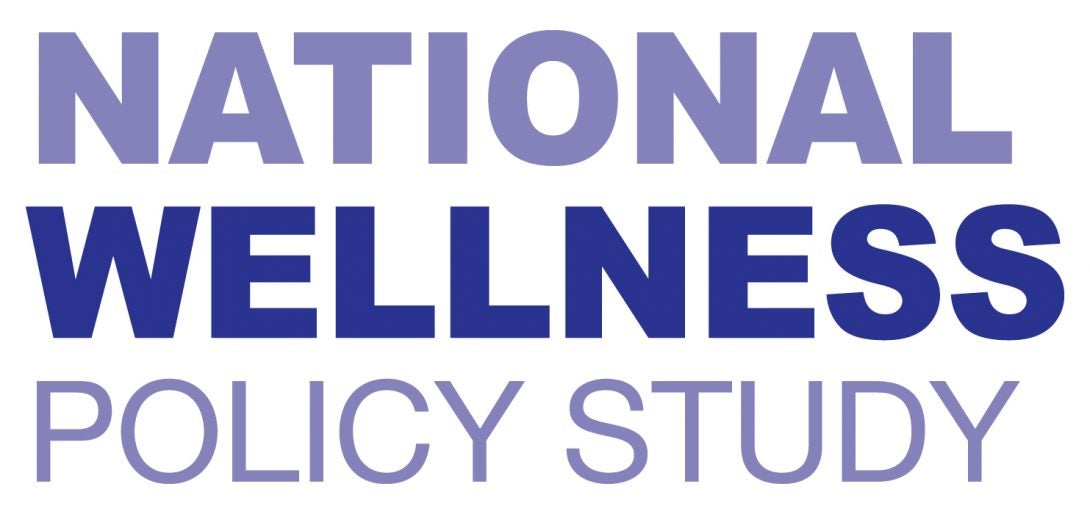Research Products: National Wellness Policy Study
Jamie F. Chriqui

Jamie F. Chriqui, PhD, and colleagues have conducted the largest, ongoing study of school district wellness and related policies since the federal government began requiring them in the 2006–2007 school year.
This research was begun with support by the Robert Wood Johnson Foundation
This research was begun with support by the Robert Wood Johnson Foundation through its Bridging the Gap research program, from 2006 to 2016.
Under a federal cooperative agreement, Dr. Chriqui’s team has been examining the implementation of school wellness laws and related policies on schools and students nationwide, from both a quantitative and qualitative perspective, in collaboration with:
- Action for Healthy Kids (Amy Moyer, MPH, RD)
- Boise State University (Lindsey Turner, PhD)
- UConn Rudd Center for Food Policy & Obesity (Marlene Schwartz, PhD)
- U.S. Department of Agriculture’s Food and Nutrition Service
Building off of the work of the National Wellness Policy Study, Dr. Yuka Asada, a member of the NWPS team, also led a qualitative study of rural school food policy implementation.
And, most recently, the team has joined forces with Child Trends; EMT Associates, Inc.; National Association of State Boards of Education; and The Raben Group to support the policy analysis and development work under the Robert Wood Johnson Foundation-supported Together for Healthy and Successful Schools Initiative. For this project, they are examining state laws and district policies related to the Centers for Disease Control and Prevention’s Whole School, Whole Community, Whole Child Framework.
The following reports and research briefs (all in PDF format) have been developed under the above-mentioned projects. This page is updated regularly as new study documents become available.
SCHOOL YEAR 2017-18 PRODUCTS
NEW! PARENTS’ PERSPECTIVES
Parent Perspectives on Local School Wellness Policy Implementation
This summary of findings report presents the results of a qualitative study that explored the perspectives of parents of middle school students on the implementation of wellness initiatives and local school wellness policies.
- Read this summary report.
"Find Strength in Numbers": Parents' advice for promoting engagement and advancing school wellness initiatives
“Find Strength in Numbers”: Parents’ advice for promoting engagement and advancing school wellness initiatives
This brief summarizes the findings from the final report, Parent Perspectives on Local School Wellness Policy Implementation, with a special focus on recommendations to parents and schools/school districts for promoting parent engagement in wellness initiatives.
Just Released-New report on state WSCC-related laws
Just Released-New report on state WSCC-related laws
As part of the Robert Wood Johnson Foundation’s Together for Healthy and Successful Schools Initiative, the National Wellness Policy Study Team at the Institute for Health Research and Policy at the University of Illinois at Chicago partnered with Child Trends and EMT Associates, Inc. to review relevant state statutes and regulations enacted as of September 2017 and analyzed their alignment with the Whole School, Whole Community, Whole Child (WSCC) model of healthy schools. The WSCC covers 10 domains: health education; physical education and physical activity; nutrition environment and services; health services; counseling, psychological, and social services; social and emotional climate; physical environment; employee wellness; family engagement; and community involvement.
- Access the report, a brief coding appendix, state profiles, and thematic and cross-cutting briefs here.
Rural School Nutrition Policy Implementation Study: Summary of Findings Report
Rural School Nutrition Policy Implementation Study: Summary of Findings Report
This report presents the results of a qualitative study that explored rural school professionals’ perspectives and experiences with school meals and Smart Snacks in Schools standards implementation. The report highlights challenges faced in rural school communities and presents strategies employed to facilitate implementation.
- Read or download this 2019 report here.
EVALUATION OF POLICIES NATIONWIDE, SY 2014-15
Working on Wellness: How Aligned are District Wellness Policies with the Soon-To-Be-Implemented Federal Wellness Policy Requirements? Nationwide Baseline Information from the 2014-15 School Year
This report provides data on district wellness policies in effect at the start of the 2014-15 school year, including: insights as to district policy readiness for or alignment with the provisions of the USDA’s wellness policy final rule given the forthcoming implementation date (SY 2017-18); baseline information that tracks the incorporation of Smart Snacks standards into district wellness policies during the first year of implementation (SY 2014-15); and an assessment of the scope and intensity of wellness policy provisions in district policies within and across all topic areas and by selected district characteristics.
- Read or download this 2017 report here (4MB PDF).
- Access the SY 2014-15 district coding tool here (1MB PDF).
Active Role States Have Played in Helping to Transform the School Wellness Environment through Policy
Active Role States Have Played in Helping to Transform the School Wellness Environment through Policy
This report provides historical data on state wellness policy-related laws (SY 2006-07 through 2014-15), baseline information on state laws related to the first year of Smart Snacks regulation (SY 2014-15), and insights as to how state laws align with the provisions of the USDA’s wellness policy final rule given the forthcoming implementation date (SY 2017-18). In addition, an assessment of the scope and intensity of requirements included in state laws governing the local wellness policy environment for all years, across all topic areas, and by selected state characteristics is included.
- Read or download this 2017 report here (11MB PDF).
- Access the SY 2014-15 state coding tool here (1MB PDF).
School District Wellness Policies: Evaluating Progress and Potential for Improving Children’s Health Eight Years after the Federal Mandate
School District Wellness Policies: Evaluating Progress and Potential for Improving Children’s Health Eight Years after the Federal Mandate
This report provides the most comprehensive evaluation to date of the content of written school district wellness policies from school years 2006–2007 through 2013–2014, the first eight years following the required implementation date for the federal mandate. Using a nationally representative sample of school districts, this report, published in June 2016, details the characteristics of these districts as well as the individual components of wellness policies and related provisions.
- Read or download this 196-page report here.
SUPERINTENDENTS' VIEWS
Superintendent Perspectives on Local School Wellness Policy Implementation: Summary of Findings Report
This summary of findings report presents the results of a qualitative study that explored superintendents’ perspectives and experiences with implementing local school wellness policies.
- Read this summary report.
Superintendent Recommendations for Local School Wellness Policy Implementation
Superintendent Recommendations for Local School Wellness Policy Implementation
This brief summarizes findings from the final summary report, Superintendent Perspectives on Local School Wellness Policy Implementation, with a special focus on recommendations for implementation and evaluations.
- Read the three-page Superintendent Recommendations brief.
Superintendent Perspectives on Food and Beverage Marketing in Schools
Superintendent Perspectives on Food and Beverage Marketing in Schools
This brief summarizes the findings from the final summary report, Superintendent Perspectives on Local School Wellness Policy Implementation, with a special focus on superintendents’ awareness and practices with respect to food and beverages marketing and fundraising in schools.
- Read the three-page Superintendent Perspectives on Marketing brief.
FOOD SERVICE DIRECTORS' VIEWS
FOOD SERVICE DIRECTORS’ VIEWS
Speaking from Experience: Food Service Directors’ Perspectives and Lessons From Implementing the Revised School Meal Standards
This brief summarizes the findings of the Food Servce Directors’ Key Informants Report with a special focus on “lessons learned” by food service directors during their experiences with implementing the updated Nutrition Standards for the National School Lunch and School Breakfast Programs.
- Read the four-page Speaking from Experience brief.
What Works? Strategies Used by Food Service Directors to Implement the Revised School Meal Standards

What Works? Strategies Used by Food Service Directors to Implement the Revised School Meal Standards
This brief summarizes the findings of the Food Service Directors’ Key Informants Report with a special focus on key strategies used by food service directors’ during the implementation of the updated Nutrition Standards for School Meals. The strategies are directed to food service directors who are still working to increase student acceptance of revised meal standard reform.
- See the four-page What Works? brief.
Food Service Director Experiences Implementing Revised School Meal Standards: Summary of Findings
Food Service Director Experiences Implementing Revised School Meal Standards: Summary of Findings
This Summary of Findings Report presents the results of a qualitative study that explored school food service directors’ experiences with implementing the updated Nutrition Standards for School Meals. The report outlines the wide range of creative strategies employed by food service directors, as well as their proactive engagement with students and the broader school community.
- See this summary report.
HIGH SCHOOL STUDENTS' VIEWS
Students’ Experiences and Perspectives on Revised School Meal and Smart Snacks Standards Reform
This Summary of Findings Report presents the results of a qualitative study that explored high school students’ experiences with implementing the updated Nutrition Standards for School Meals. High school students were affiliated with a social justice organization, Funders’ Collaborative on Youth Organizing (FCYO). The report outlines students’ recommendations for fostering healthy school food environments.
- Read this summary, released in November 2016.
Students’ Insights on School Meal Reform

Students’ Insights on School Meal Reform
This brief summarizes the findings of the High School Students’ Summary of Findings Report with a special focus on their perspectives and experiences during implementation of the updated Nutrition Standards for the National School Lunch and School Breakfast Programs.
- Read this brief, released in 2016.
Student Recommendations for Improving the School Food Environment
This brief summarizes the findings from the High School Students’ Summary of Findings Report with a special focus on recommendations for improving the school food environment that emerged out of students’ experiences with the updated Nutrition Standards for the National School Lunch and School Breakfast Programs. The recommendations are directed to schools that are continuing to work on creating healthier school food environments, and the organizations that support them.
NUTRITION EDUCATION
Another Partner in the Classroom: The Role of Nutrition Education in the Implementation of School Nutrition Policies
This poster presentation combines findings from qualitative key informant interviews and focus groups to highlight how nutrition education was perceived as an important component of updated nutrition standards implementation. Food Service Directors and high school students from across the nation identify ways in which nutrition education was and should be included in implementation processes.
- Read or download the poster presentation here.
SMART SNACKS EXEMPTIONS
State Policies on Smart Snacks Fundraiser Exemption
This state-by-state chart tracks fundraiser exemption policies that allow for a certain number of infrequent school fundraisers that do not have to meet the federal requirements of the “Smart Snacks” competitive food rule. The chart is updated quarterly.
- September 2018 state fundraiser exemptions
- March 2018 state fundraiser exemptions
- December 2017 state fundraiser exemptions
- September 2017 state fundraiser exemptions
- June 2017 state fundraiser exemptions
- March 2017 state fundraiser exemptions
- December 2016 state fundraiser exemptions
- September 2016 state fundraiser exemptions
- June 2016 state fundraiser exemptions
- March 2016 state fundraiser exemptions
- November 2015 state fundraiser exemptions
- August 2015 state fundraiser exemptions